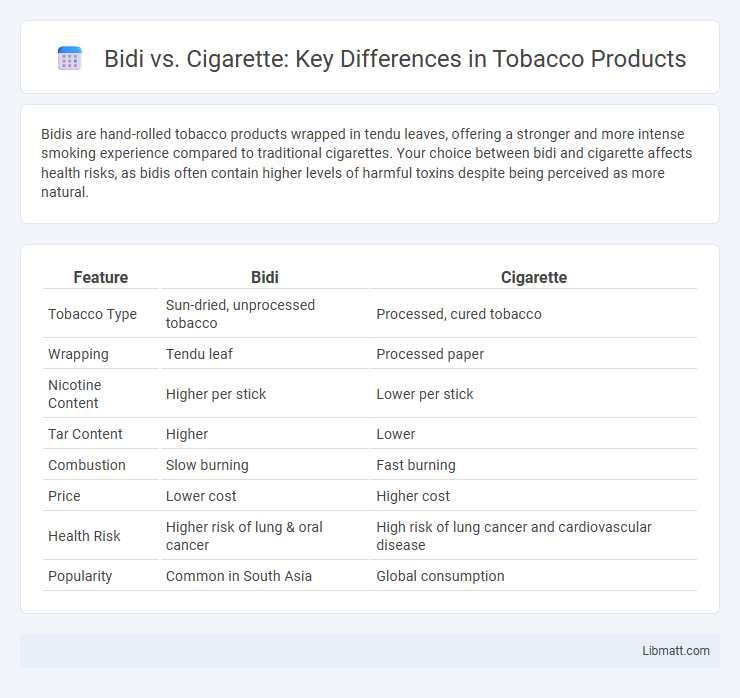Bidis are hand-rolled tobacco products wrapped in tendu leaves, offering a stronger and more intense smoking experience compared to traditional cigarettes. Your choice between bidi and cigarette affects health risks, as bidis often contain higher levels of harmful toxins despite being perceived as more natural.
Table of Comparison
| Feature | Bidi | Cigarette |
|---|---|---|
| Tobacco Type | Sun-dried, unprocessed tobacco | Processed, cured tobacco |
| Wrapping | Tendu leaf | Processed paper |
| Nicotine Content | Higher per stick | Lower per stick |
| Tar Content | Higher | Lower |
| Combustion | Slow burning | Fast burning |
| Price | Lower cost | Higher cost |
| Health Risk | Higher risk of lung & oral cancer | High risk of lung cancer and cardiovascular disease |
| Popularity | Common in South Asia | Global consumption |
Introduction to Bidi and Cigarette
Bidi is a traditional Indian smoking product made by rolling tobacco in tendu or temburni leaves, often tied with a colorful thread, which contains less processed tobacco compared to cigarettes. Cigarettes consist of finely cut tobacco wrapped in paper and usually include chemical additives designed for consistent flavor and burn rate. Both products differ significantly in composition, cultural significance, and health impact profiles.
Historical Background of Bidi and Cigarette
Bidis originated in India during the 17th century as hand-rolled cigarettes made from tendu leaves and indigenous tobacco, serving as an affordable alternative to conventional cigarettes. Cigarettes, on the other hand, have a longer global history, evolving in the early 19th century with mass production during the Industrial Revolution, predominantly using processed tobacco wrapped in paper. This divergence highlights bidis' cultural significance and localized production compared to the cigarette's industrialized and worldwide consumption.
Composition and Ingredients
Bidis consist of hand-rolled tobacco wrapped in tendu or temburni leaves, containing fewer chemicals but higher levels of nicotine and tar compared to cigarettes. Unlike cigarettes with processed tobacco and added flavors or chemicals, bidis use unprocessed, natural tobacco leaves, which may increase exposure to harmful carcinogens. Your choice between bidis and cigarettes influences the type and amount of toxic substances you inhale during smoking.
Manufacturing Process Comparison
Bidis are handcrafted using tendu leaves tightly rolled around shredded tobacco, requiring manual skill and natural materials, whereas cigarettes are mass-produced by machines with processed tobacco wrapped in paper treated with chemicals. The bidi manufacturing process involves less industrial automation but higher labor intensity, often in small-scale cottage industries, while cigarette production is highly mechanized with standardized quality control. Your choice between bidi and cigarette reflects not only product preference but also the distinct production methods that impact cost, consistency, and environmental factors.
Popularity and Cultural Significance
Bidis, traditional hand-rolled cigarettes popular in South Asia, hold significant cultural value as symbols of heritage and affordability compared to manufactured cigarettes. Cigarettes dominate global markets due to aggressive marketing and convenience, often perceived as status symbols in Western cultures. Your choice between bidi and cigarette reflects both cultural identity and personal preference influenced by regional popularity and social norms.
Health Risks and Side Effects
Bidi smoking exposes users to higher levels of nicotine, tar, and carbon monoxide compared to cigarettes, increasing the risk of respiratory diseases, cardiovascular problems, and oral cancers. Unlike filtered cigarettes, bidis contain unprocessed tobacco wrapped in tendu leaves, which contributes to greater toxin inhalation and more severe side effects such as bronchitis and chronic obstructive pulmonary disease (COPD). Studies indicate that bidi smokers have a higher prevalence of lung cancer and other serious health complications compared to cigarette smokers.
Addictive Potential: Bidi vs Cigarette
Bidis contain higher levels of nicotine and tar compared to cigarettes, increasing their addictive potential. Their unprocessed tobacco and lack of filters result in stronger nicotine absorption, making cessation more challenging. Understanding these differences helps you assess the risks associated with bidi smoking versus traditional cigarettes.
Legal Regulations and Policies
Bidi and cigarette products are governed by distinct legal regulations and policies that vary by country, often reflecting differences in health risks and cultural contexts. Many governments impose stricter controls on bidis due to their association with traditional and unregulated production, including taxation, packaging warnings, and sales restrictions to minors. Tobacco control policies aim to reduce consumption through these measures, with bidis sometimes facing separate regulations from manufactured cigarettes to address their unique market and health implications.
Environmental Impact
Bidis generate significantly more waste compared to traditional cigarettes due to their handmade leaf wrapping and use of non-biodegradable materials in packaging. The production process of bidis involves more intense deforestation and pesticide use, contributing to soil degradation and water pollution. Cigarette butts, containing plastic filters, persist in the environment for years, but bidis' natural leaf wrapping decomposes faster, slightly reducing litter pollution.
Conclusion: Which is Worse?
Bidi smoking exposes you to higher levels of nicotine, tar, and carbon monoxide compared to regular cigarettes, increasing the risk of respiratory and cardiovascular diseases. Cigarettes contain additives that alter burn rate and flavor, but bidis' unfiltered, hand-rolled nature often results in more harmful smoke inhalation. On balance, bidis are generally considered more harmful due to their concentrated toxic substances and lack of filtration.
Bidi vs Cigarette Infographic

 libmatt.com
libmatt.com